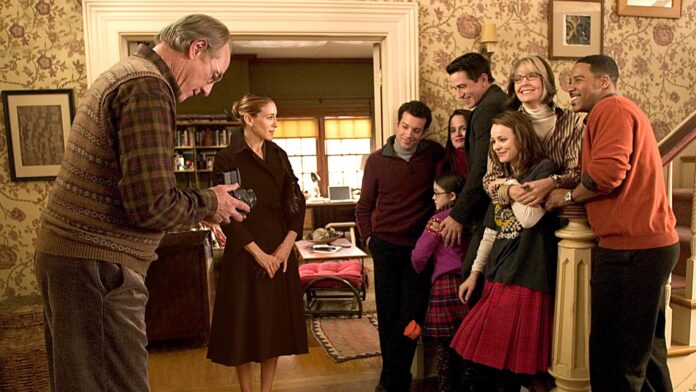Editor’s note: Since it’s December and we’re officially in the full swing of all things Christmas, I wanted George to watch a Christmas movie, but it was a bit difficult to land on a pick that he hadn’t already seen. Guess he really loves all things Christmas! But I figured he might have skipped a film less on the jolly side of things, and The Family Stone immediately came to mind. It’s a divisive flick – you either hate it or love it, and I wanted to see where George would land, especially when we throw his love for Rachel McAdams into the mix.
Think of a festive film and what do you expect? A hint of magic, perhaps. A blossoming romance (or nine, in the case of Love Actually) that is utterly cheesy but kind of captivating. Maybe a redemptive arc for a grouchy character as they finally discover what the meaning of Christmas really is.
Above all else, though, you expect it to be uplifting, a hit of warmth as the days get colder. (See While You Were Sleeping for a great example.)
What makes The Family Stone such a conundrum, then, is that while it is ultimately a Christmas comedy-drama, it doesn’t really offer any of these things. It’s full of unlikeable characters who have no real redemption come the end of the film. The romance threads are half-baked at best, completely nonsensical at worst. And there’s no real sense of magic at any point throughout the movie’s runtime, with the story taking one slightly dark turn after another with no major cause for optimism.
Let’s take a look at those characters, for starters. We’re led to believe Sarah Jessica Parker’s Meredith Morton is the epitome of evil, for some reason or other, but there isn’t really any justification for the family to be that mean to her, surely? It’s Christmas, guys! The time for forgiveness, for being open-minded, friendly, jolly. Where’s the festive spirit?
Each member of the family is slightly Krampus-y in their own way. Rachel McAdams’ Amy is admittedly pretty funny, a definite highlight, but she’s acting like a spoiled teenager while seemingly well into her twenties – somebody have a word. Diane Keaton’s Sybil clearly has her own stuff going on, but straight-up denying her son’s wish to marry? That isn’t very Christmassy, mum. And Luke Wilson’s Ben … well, where do we start with that creep?
There are flawed characters, and then there’s the Stone family, who throw harsh comments and make questionable decisions, and seemingly have no desire to improve as people.
From this, it’s no surprise that the romance subplots fail to really land. If you’re following irredeemable characters, it’s tough to root for their success at the best of times. But when they’re scheming behind each other’s backs, it becomes nearly impossible to do so. Throw in the fact that most of these subplots are seemingly thrown together at will – why does Claire Danes’ Julie fall for Everett (Dermot Mulroney) again? – and that’s especially so.
Both within the romantic elements and outside of them, there’s none of that trademark Christmas magic here, no miracle that pushes this into the realm of festive fantasy.
There’s the undercurrent of Sybil’s illness throughout, for example, but no hope that she’s going to pull through, and no urgent push from the family to appreciate each other should the worst possible outcome arise.
Knowing you may only have limited time left with your family, would you really choose to pick one fight after another, as Sybil seemingly loves to do? Or knowing your mother is seriously ill, would you really speak to her with total disdain, even if she was acting unreasonable, as Everett does time and time again?
After all of this grief and grumpiness, Sybil (spoiler) doesn’t pull through for the following Christmas, leaving viewers on a sour note. I’m all for being realistic, being true to life – people die, whether we like it or not, I get it – but is this really the place? Again, it’s Christmas! Lighten the tone!
While Thomas Bezucha’s comedy-drama perhaps leans a little too heavily into the flaws of its characters, though, there’s no denying that most of us can at least relate to the chaotic Christmas scene that forms as family members from across the country, each with their own quirks, views, and opinions, descend into one shared, overcrowded space.
Whether it’s the good – such as Sybil’s steadfast support of her son’s Thad’s relationship – the bad – such as the awkward discussions of politics at the dinner table – or the ugly – such as the full-on Benny Hill-style fight around the kitchen – the festive period is one where all of the strengths and shortcomings of family come to the surface, and The Family Stone does exhibit the full spectrum of situations this can lead to with competence.
It might not bring the heartwarming hit of joy that, say, Christmas with the Kranks does, but it does offer a warts-and-all study of family, and all of the fun and foolishness that loved ones can bring. It’s so effective in this, in fact, that its final gut-punch scene does manage to land, despite the emptiness you may feel towards the individual characters themselves, as the camera pans to that photo of a young, pregnant Sybil.
So, yes, if you’re wanting an uplifting watch that ticks all the usual festive boxes, The Family Stone ain’t it. If you’re wanting a well-written, well-thought-out piece of filmmaking, well, The Family Stone ain’t it either. But if you’re holed up in your long lost relatives’ cramped home as fights break out in the kitchen, maybe taking comfort from the relatability of The Family Stone is exactly what you’re wanting.

